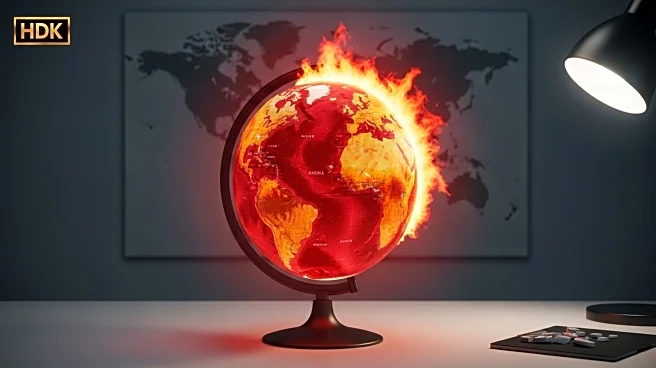What's Happening?
A recent statistical analysis by the International Institute of Environment and Development (IIED) has revealed a significant increase in the number of extreme heat days in major world cities. The study defines extreme heat as temperatures reaching 35°C (95°F) or above. The analysis highlights that the three years with the highest total days of extreme heat have all occurred since 2019, with 2024 being the hottest year on record. This trend underscores the urgent need for cities to adapt to climate change, as extreme heat is likely to have caused the early death of millions of people over the past three decades. The report emphasizes that the elderly and poor in fast-growing cities are most deeply affected by these conditions.
Why It's Important?
The findings of the IIED report are significant as they highlight the growing impact of climate change on urban environments. The increase in extreme heat days poses a serious threat to public health, particularly for vulnerable populations such as the elderly and those living in poverty. The urban heat island effect exacerbates these conditions, making it crucial for cities to implement adaptive measures. The report calls for immediate action to address these challenges, as failing to adapt could lead to increasingly dangerous living conditions for city dwellers. The study also points to the broader implications of climate change, including the need for global cooperation to mitigate its effects.
What's Next?
The report suggests that cities need to accelerate the adoption of strategies to combat extreme heat, such as establishing cooling centers, shaded rest areas, and early-warning systems. The Global Center on Adaptation has launched a campaign called 'The Heat is On' to promote these strategies. Additionally, the report calls for governments to prioritize climate adaptation in their policies and planning. The findings may prompt further discussions among policymakers, urban planners, and environmental organizations on how to effectively address the challenges posed by extreme heat and climate change.
Beyond the Headlines
The report highlights the ethical and social dimensions of climate change, particularly the disproportionate impact on low-income communities and those living in informal settlements. It raises questions about the responsibility of governments and the international community to protect vulnerable populations from the effects of climate change. The study also underscores the need for a shift in energy policies, moving away from fossil fuels towards renewable energy sources to reduce greenhouse gas emissions and mitigate global warming.









